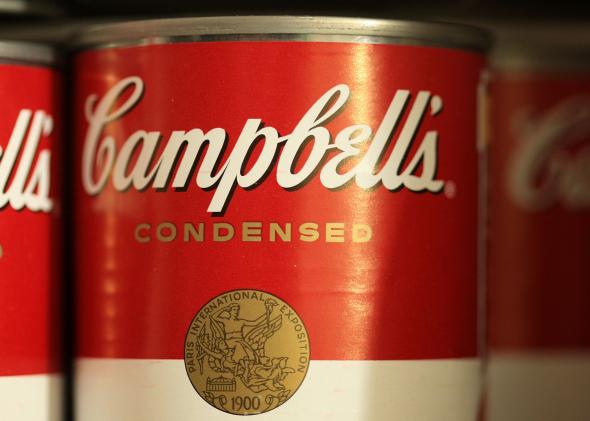America’s Obsession With Healthy Food Is Driving Campbell’s Away From the Soup Business

Photo by David McNew/Getty Images
Just one day after McDonald’s CEO Don Thompson stepped down following a string of rather spectacular failures, Campbell Soup Co. is also giving in to U.S. consumers. On Thursday, Campbell, the corporation behind brands like Pepperidge Farm, V8, Prego, and of course its eponymous label, announced a major restructuring. Instead of organizing around brands and geography, Campbell said it will split its operations into three product-based divisions: “America’s simple meals and beverages,” “global biscuits and snacks,” and “packaged fresh.”
Campbell, for a bit of background, has by now spent the better part of five years trying to turn its company around. The chief challenge to date: getting American consumers back on board with its core soup business. As far back as 2011, sales of soup in the U.S. were declining, hurt by rising ingredient costs and budget-conscious shoppers. In early 2012, Campbell tried introducing on-the-go soup-in-a-bag to reel in millennials. The supposedly “hip” product got a fair amount of ridicule, and even found its way onto The Colbert Report. (“It’s like Capri Soup!” he quipped.) Next up was Campbell Soup K-Cups, a concept the company rolled out in September 2013 and investors seemed to rally behind. But soup kept declining. In the last fiscal quarter of 2014, Campbell’s U.S. soup sales fell 3 percent.
“The trend is toward healthier food,” says John Staszak, an analyst at Argus Research Co. “People are just changing their preferences toward healthier food, and everybody’s having problems with consumer staples doing bad.”
That said, Campbell has been making a big effort to shift its focus toward those new, health-centric trends. It acquired Bolthouse Farms, a producer of fresh carrots and juices, in 2012 and then Plum Organics, a maker of organic baby food, in 2013—both of which boosted sales. Campbell’s stock has risen nearly 30 percent over the past two years and 8 percent in the past six months. But those gains have been in spite of its core soup business, not because of it. With its newly announced reorganization and shift away from soup, Campbell’s is no doubt hoping to make the momentum last.
